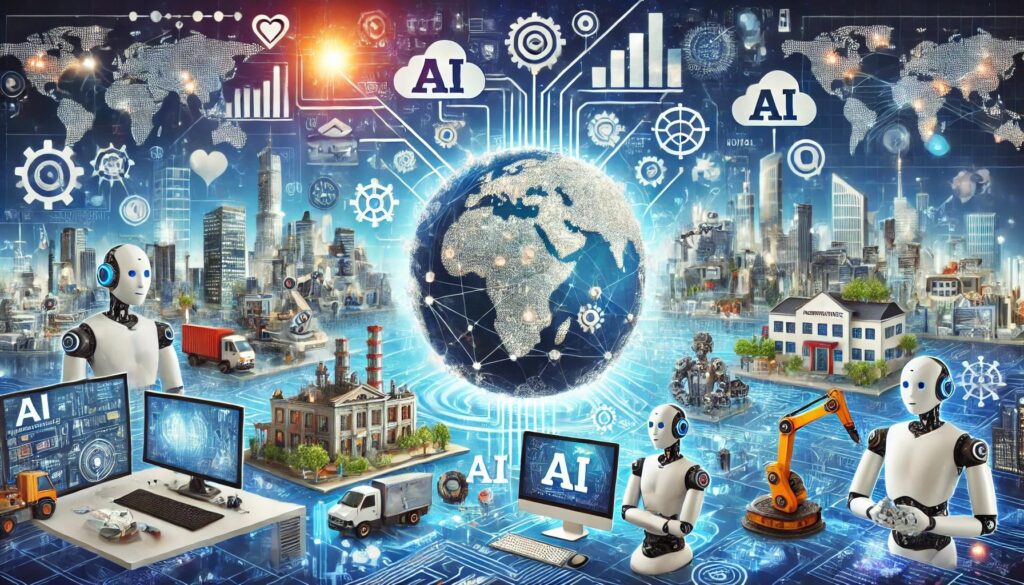Artificial Intelligence (AI) is tranforming industries across the globe, reshaping how businesses operate, innovate, and serve their customers. From healthcare to finance, manufacturing to retail, AI’s impact is far-reaching, driving efficiency, improving accuracy, and unlocking new levels of intelligence. Here’s a look at how AI is transforming various industries:
AI is fundamentally changing healthcare by enabling faster diagnoses, personalized treatments, and enhanced patient care. AI-driven systems can analyze vast amounts of medical data, helping doctors make more informed decisions. Robotics and AI-powered devices assist in surgeries, while AI algorithms detect diseases like cancer earlier through medical imaging analysis. Virtual health assistants, AI chatbots, and remote monitoring tools are improving patient outcomes.
2. Finance:
In the finance sector, AI is optimizing trading strategies, detecting fraudulent transactions, and automating customer services. AI algorithms analyze market trends in real-time, enabling institutions to make quicker, data-driven investment decisions. AI-powered chatbots and virtual financial advisors are reshaping customer interactions, providing tailored financial advice, and assisting with account management, all while operating 24/7.
3.Manufacturing:
AI is transforming manufacturing by streamlining production lines and improving quality control. Smart factories leverage AI and robotics to automate repetitive tasks, predict machine failures, and optimize workflows. AI-powered sensors monitor equipment in real-time, reducing downtime and maintenance costs. In product design, AI helps create more efficient models, speeding up the innovation cycle..
4. Retail:
In retail, AI is enhancing customer experiences and boosting operational efficiency. AI-driven recommendation engines provide personalized shopping suggestions, while chatbots assist customers in real time. In stores, AI-powered cameras track customer behavior and optimize product placements. Inventory management is also becoming smarter with AI predicting demand, minimizing waste, and ensuring better stock availability.
5. Supply Chain and Logistics:
AI is optimizing logistics and supply chains by automating route planning, improving demand forecasting, and enhancing inventory management. AI algorithms ensure faster delivery times and reduced costs through better supply chain visibility. Autonomous vehicles and drones are also being integrated into logistics, making last-mile delivery more efficient.
6. Education :
AI is playing a crucial role in education by personalizing learning experiences. AI-driven platforms analyze student performance and adapt content to fit individual needs. Virtual tutors, AI-based grading systems, and learning analytics are helping educators provide better support to students, ensuring more effective learning paths.
7. Agriculture :
AI is transforming agriculture through smart farming techniques that increase efficiency and crop yield. AI-powered systems use sensors and drones to monitor soil conditions, crop health, and weather patterns. Machine learning algorithms help optimize irrigation, fertilizer use, and pest control. Autonomous machinery such as tractors and harvesters are reducing labor costs and improving productivity, leading to more sustainable farming practices.
8. Energy :
AI is helping the energy industry become more efficient and sustainable. AI-driven predictive analytics optimize energy production, distribution, and consumption. In renewable energy, AI helps manage wind farms and solar grids, predicting weather patterns to optimize energy output. AI also plays a crucial role in energy trading, automating transactions and forecasting market trends. Smart grids powered by AI ensure better load management, reducing outages and improving energy efficiency.
9. Transportation :
The transportation industry is seeing revolutionary changes with AI. Autonomous vehicles, such as self-driving cars and trucks, are being developed to reduce accidents and increase efficiency. AI also powers ride-sharing apps, optimizing routes and reducing fuel consumption. In aviation, AI is used for predictive maintenance and optimizing flight routes, while AI algorithms in traffic management help reduce congestion in urban areas.
10. Telecommunications :
AI is enhancing telecommunications by improving network management and customer service. AI algorithms monitor and optimize network performance, ensuring better connectivity and fewer outages. Virtual assistants and AI-driven customer service bots handle inquiries, troubleshoot issues, and resolve complaints more efficiently than traditional methods. AI also helps telecom providers offer personalized services, predicting user behavior and offering tailored data plans.
11. Real Estate :
In the real estate industry, AI is helping buyers, sellers, and investors make more informed decisions. AI-driven platforms analyze property values, market trends, and customer preferences to provide accurate price predictions. Virtual property tours, powered by AI, offer potential buyers an immersive experience. AI also helps real estate agents target potential buyers with tailored property recommendations, improving customer experience and closing sales faster.
12. Entertainment :
AI is reshaping the entertainment industry by creating personalized content recommendations, improving production workflows, and even generating content. Streaming platforms like Netflix and YouTube use AI algorithms to recommend shows and videos based on user behavior. AI also plays a role in visual effects, video editing, and even scriptwriting, reducing production time and costs. Virtual reality and AI are merging to create immersive, interactive experiences for users.
The Future of AI Across Industries
AI’s integration into these industries is just the beginning. As AI continues to evolve, we will see even more advanced systems that can solve complex problems, make accurate predictions, and enhance human capabilities. The key to success lies in harnessing AI’s potential while ensuring ethical use, transparency, and security.
AI is not just a trend; it’s a transformative force shaping the future of industries worldwide. Whether through automating tasks, improving decision-making, or creating entirely new business models, AI is ushering in an era of unprecedented innovation.



